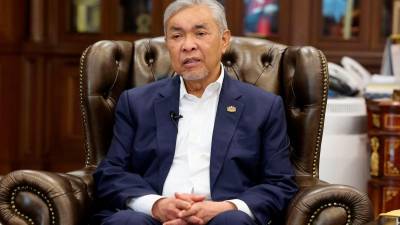PUTRAJAYA: While drug addiction may seem like an individual issue, it can be a much broader and serious social issue for the country, according to Deputy Prime Minister Datuk Seri Dr Ahmad Zahid Hamidi.
In fact, he said the drug addiction issue reflects the weaknesses in the social support system, which should act as a crucial defence against the scourge.
As chairman of the Cabinet Committee on Eradication of Drugs (JKMD), Ahmad Zahid said that the rising number of drug addicts reflects shortcomings at the family, educational, and community levels in providing adequate protection.
“Drugs not only threaten health and safety but also pose a threat to social structure, human capital development, and national progress. Therefore, the role of key social institutions, such as religious bodies, schools, and families, is critical in curbing the worsening drug crisis,” he told Bernama in a recent interview.
He also highlighted the upcoming launch of the 2025-2027 Anti-Drug Communication Plan, which aims to tackle drug abuse holistically through a comprehensive, targeted campaign and seeks to raise awareness, provide intervention, and offer support more effectively across various segments of society.
Ahmad Zahid said the campaign will involve families, schools, higher education institutions, workplaces, and religious institutions.
He said mosques, suraus, and tahfiz institutions, for example, would be mobilised as centres for prevention and early intervention through programmes such as anti-drug sermons, counselling, and rehabilitation, while state religious officers and Islamic non-governmental organisations (NGOs) will also be engaged as advocacy partners.
“The breakdown of family institutions has been identified as a key factor increasing children’s vulnerability to drugs. Thus, programmes like Family of Association (FOA) and family intervention initiatives are being strengthened.
“Awareness messages are disseminated via television, radio, and documentaries with the core narrative ‘Prevention Starts at Home,’ emphasising parents’ roles as models and protectors. We want parents to be the primary agents of prevention at home, not relying solely on external agencies,” he explained.
Furthermore, he said JKMD is collaborating with the Ministry of Education to enhance value-based prevention modules, build student resilience, and train guidance counsellors and teachers to detect risky behaviours early.
The Deputy Prime Minister also said that the National Anti-Drugs Agency (AADK) is committed to focusing its strategies on youth aged 15 to 39, who account for 61 to 68 per cent of drug addicts in Malaysia.
He said most addicts are males within the productive age group, necessitating prevention efforts that are comprehensive, focused, and aligned with youth lifestyles.
“The programmes implemented are tailored to suit interests and needs, incorporating elements of character building, decision-making skills, and other social competencies essential for personal development among adolescents, youth, and adults regardless of gender or background,” he said.
Among key strategies is the Anti-Drug Squad, which is a youth volunteer initiative acting as social change agents and community frontline workers trained in basic drug knowledge, communication skills, and community-based intervention to prevent drug influence among youth.
AADK also runs parenting programmes as early prevention strategies by empowering parents to tackle drug-related issues at home and within communities, fostering resilient, caring families responsive to social challenges involving their children.
Other initiatives include the Drug-Free Village Program (KABD), which mobilises diverse community sectors such as village committees, mosques, schools, and NGOs, as well as the SMART Program (Successful, Mature, Active, Rational, Responsible) focusing on building youth identity, mental and physical resilience, leadership, and self-discipline.
“With these strong ties, we aim to build a resilient, knowledgeable, and proactive society committed to working together to create a drug-free Malaysia, in line with the narrative ‘Drug Prevention is a Shared Responsibility,’” he concluded. – Bernama
